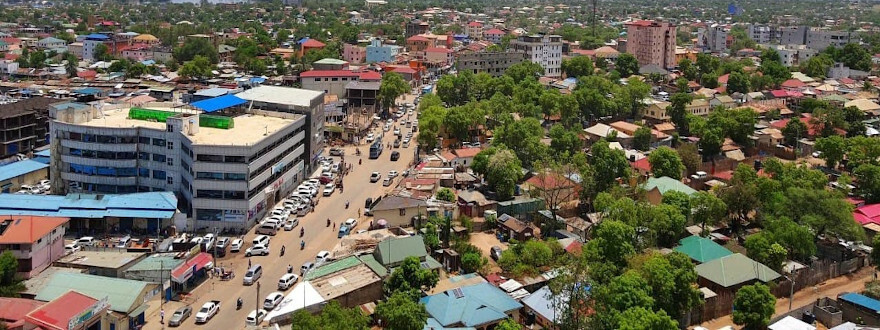It’s been observed that for over a decade since independence on 9th July 2011, an influx of foreign nationals from African countries and Asian countries dominate the development and humanitarian sectors in our country, namely, the humanitarian sector and private sector (oil and non-oil businesses).
There evidently more harm than good. For example, those individuals and businesses enrich themselves, and sadly, they corrupt the echelons of senior levels of leadership in our government to keep their greedy ambitions. For example, they strive to strengthen their presence by dealing directly or indirectly with the high offices such as the office of the President, VPs and ministers and all other senior civil servants in immigration, security and the rest. Unfortunately, the mission or mandate of these agencies/businesses has been to weaken the efforts to use the resources for the social and economic betterment of the nascent state of South Sudan and its people, who have suffered enough from decades of the liberation struggle.
The situation is so serious that it raises the following questions…. What measures can our government take to break the silence from reforming this vital sector of the economy? Why should the grant contracts/projects or consultants, project managers, and country representatives necessarily be from foreign countries? Were some of our ministers and technocrats not justified to reject intimidation for imposing plans on their institutions by these expatriates heading such businesses/or organizations? Are our youth also not justified to protest and demand transparency and accountability against this domination by those foreigners in the UN and NGO systems? What makes us think that the competencies required for UN and INGOs cannot be matched by our experienced graduates and retired technocrats, and why is our government allowing such massive contracts/or donor funding in the hands of citizens from other governments? Are our relevant institutions/ministries not a total failure or disaster? Those questions and many more continued to raise an eye browse questioning the type of policies and decisions that perpetuate such practices in our country where humanitarian assistance has been crucial to saving lives.
To elaborate on this serious situation, it has become a phenomenon that agencies/or businesses would fake their reports and claims to secure contracts/ or design projects and showcase them to escape accountability by appearing on national TV, displaying workshops in disguise of capacity building which for years failed to have any significant impact to the humanitarian conditions affecting the lives of beneficiaries. Interestingly, It is a known fact that across all sectors in Juba, the Africans and Asians have divided up the business sector as well as the UN agencies and International NGOs and donor projects amongst themselves, assigning only their own citizens (UNMSS, UNDP, UN WOMEN, UNICEF, WHO, FAO, etc.), while the nationals including learned and experienced men and women from the three national universities, graduates from Sudan, graduates from the African countries and beyond (Asia, Europe and America) continue to languish and struggle with living, and their expertise goes wasted over the years in our public without employment.
Governments and academic researchers have recognized with statistical evidence drawn from performance evaluations internally and externally that both businesses and humanitarian organizations have been failing to deliver their mandate and instead perpetuate the state of crises for them to sustain their money-making and employment (corruption and nepotism)- see report on companies operations and humanitarian assistance agencies in South Sudan and most developing countries- International Crisis Group -ICG and Global Witness report on NGOs and UN agencies corruption 2020, 2021 and 2022 respectively.
Many would agree that the time is now for the legislatures and decision-makers to take this concern seriously against the growing public anger and the increasing violence against humanitarian workers, which disrupt the genuine intentions of donors to help those in dire need of humanitarian help, especially in war-affected countries by man-made and natural disasters. In essence, the search should begin with finding and identifying the challenges facing government (s) to take the “nationalisation or indigenization” of these resources (humanitarian aid, oil and non-oil) for sustainable development seriously. Take the example of Kenya, Sudan, Ethiopia and Uganda. Have you ever heard of such a large number of foreign nationals being dominant and uncontrollable in the private sector or in senior positions of NGOs or UN agencies? Why such a vulnerability? What is the role of the economic cluster ministries, public and civil service and security sectors?
It’s our hope that this piece of reality check will get the serious attention it deserves for sustainable peace and socio-economic progress because it is alarming to see hundred of thousand of our population live on less than a dollar a day and many go to bed hungry when the country is blessed with rich human and natural resources.
Joseph Madak Wuol is a former Head of the Government Performance Management Secretariat in the Office of the President. He held different senior capacities in the government of then Sudan in Southern Sudan. He’s a PhD holder in Public Policy Administration in the area of Performance Management in an E-Government. He can be reached via email: josephwuol2014@gmail.com
The views expressed in ‘opinion’ articles published by Radio Tamazuj are solely those of the writer. The veracity of any claims made is the responsibility of the author, not Radio Tamazuj.




